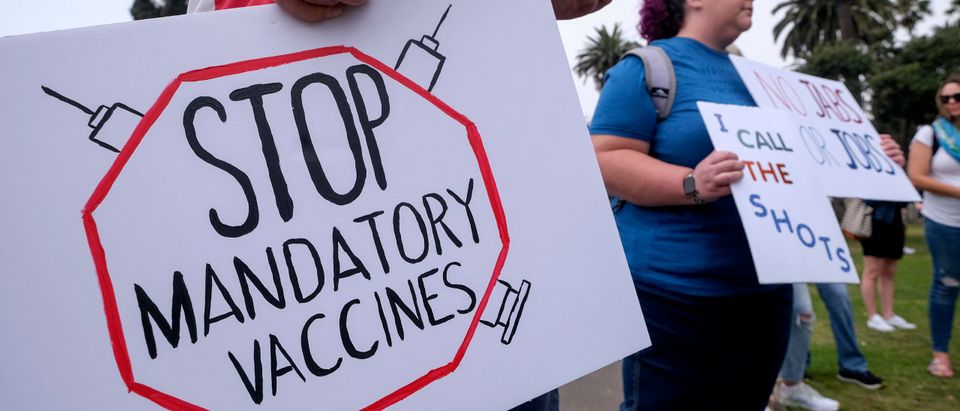Editor’s note: We endeavor to bring you the top voices on current events representing a range of perspectives. Below is a column arguing that vaccine mandates will not be enough to defeat the virus. You can read a counterpoint here, where Professor John P. Moore and Council on Foreign Relations senior fellow Luciana Borio argue that universal vaccination, including mandates, are the most effective way of ending the pandemic.
Historians will view the rapid development of the COVID-19 vaccine as one of the greatest accomplishments of the 21st century. Nevertheless, mandatory vaccination will not end the COVID-19 pandemic.
Shortly after the SARS-CoV-2 virus reached the U.S., it became apparent that COVID-19 – the disease the virus produces — would profoundly impact life in this country and abroad. Absent a vaccine, millions would become infected. Although most would not become seriously ill, many thousands would die. The elderly and those with chronic diseases were especially vulnerable.
Development of a vaccine in time to alter the course of the epidemic would be unprecedented. As such, the Trump Administration’s Operation Warp Speed was a longshot. However, through a novel public-private partnership that included investments in technology, manufacturing capacity and clinical studies; careful selection of vaccines and platforms; and importantly, increased regulatory flexibility that allowed for concurrent performance of typically sequential steps and a defined pathway to safe introduction, the administration accomplished a miracle. Generally safe and extraordinarily effective vaccines were available for use within a year.
However, despite this triumph, it is naïve to believe vaccination will eradicate the SARS-CoV-2 virus or itself put an end to the pandemic. Hence, coercive SARS-CoV-2 vaccine mandates are under most circumstances misplaced and counterproductive, achieving minor gains at the cost of abridgement of civil liberties and heightened mistrust in public health authorities, political leaders and other government officials.
First, even if we could theoretically end the pandemic and eliminate the virus through vaccination – an unrealistic assumption – the effort would require rapid vaccination of the world’s population, a practical impossibility. Second, like other viruses – particularly those for which RNA is the genetic material – SARS-CoV-2 will continue to mutate, creating new variants that will enhance its ability to evade or partially neutralize the immunity conferred by vaccination directed toward the spike protein that mediates infection of human cells.
Finally, natural immunity gained from exposure to SARS-CoV-2 is an essential fundamental mechanism by which humanity will eventually tame the virus. Although vaccines are highly effective at preventing serious infections and death, they offer incomplete protection against infection itself, allowing the virus to spread among the population through mild or asymptomatically infected carriers.
SARS-CoV-2 must be viewed in the context of the many other viral respiratory infections with which we routinely co-exist. SARS-CoV-2 has been damaging because we have not previously been exposed to it, not because it is intrinsically more dangerous than other viruses. In fact, the high level of effectiveness of both vaccination and infection at lessening severe disease and preventing occurrence and reoccurrence suggest a ready human ability to develop immunity directed toward SARS-CoV-2 and a reassuring susceptibility to natural human defenses against viral and bacterial pathogens.
Intuitively, immunity gained through infection seems likely to be broader and more durable than that conferred by vaccination. In contrast to vaccines, which give the recipient exposure only to the SARS-CoV-2 spike protein, infection teaches the immune system to attack a broader range of the virus’ proteins, rendering the individual less susceptible to viral variants that have accumulated immune-evading modifications in the spike protein. Some studies have suggested infection provides an immune response that is superior to that induced by vaccination, with an Israeli study finding a 13-fold greater risk of SARS-CoV-2 infection among vaccine recipients without prior infection than in unvaccinated individuals who had been previously infected.
Without wading into the debate about the need for vaccination in previously infected individuals, the clear protection both vaccination and infection provide against severe disease and the differences in the manner in which they confer immunity suggest these means of exposure are best viewed as complementary. Neither is absolutely protective, “breakthrough” infections occur with both, but together they are our best bet to expeditiously render SARS-CoV-2 as just another endemic respiratory virus – typically mild while occasionally producing severe disease in vulnerable individuals.
Individuals who chose not to become vaccinated are taking a small, age and health-dependent risk that for some is not inconsequential. Given the contagiousness of SARS-CoV-2, sooner or later they are likely to be infected. However, because of the excellent protection vaccines provide, the risk they have assumed is largely confined to themselves. Such individuals should not be shamed, punished and or coerced.
It is now time to step back and dispassionately consider where we are relative to where we have been. Most COVID-19 deaths are in unvaccinated individuals. The risk of serious COVID-19 disease for most of the approximately 200,000,000 fully vaccinated people in the United States is miniscule.
Although they will primarily benefit the unvaccinated, promising new treatments are on the horizon. Mandatory vaccination is unnecessary and undesirable. Repeated exposures – mostly benign — bolster our individual and population immunity. It is time to put COVID-19 behind us and move forward with our lives without fear.
Roger D. Klein, M.D., J.D., a pathologist, is an expert with the Regulatory Transparency Project’s FDA and Health Working Group, a faculty fellow at the Center for Law, Science and Innovation at the Sandra Day O’Connor School of Law, and a policy advisor to the Heartland Institute. A former advisor to HHS, FDA, and CDC, he completed his medical training at Yale School of Medicine and received his law degree from Yale Law School.


